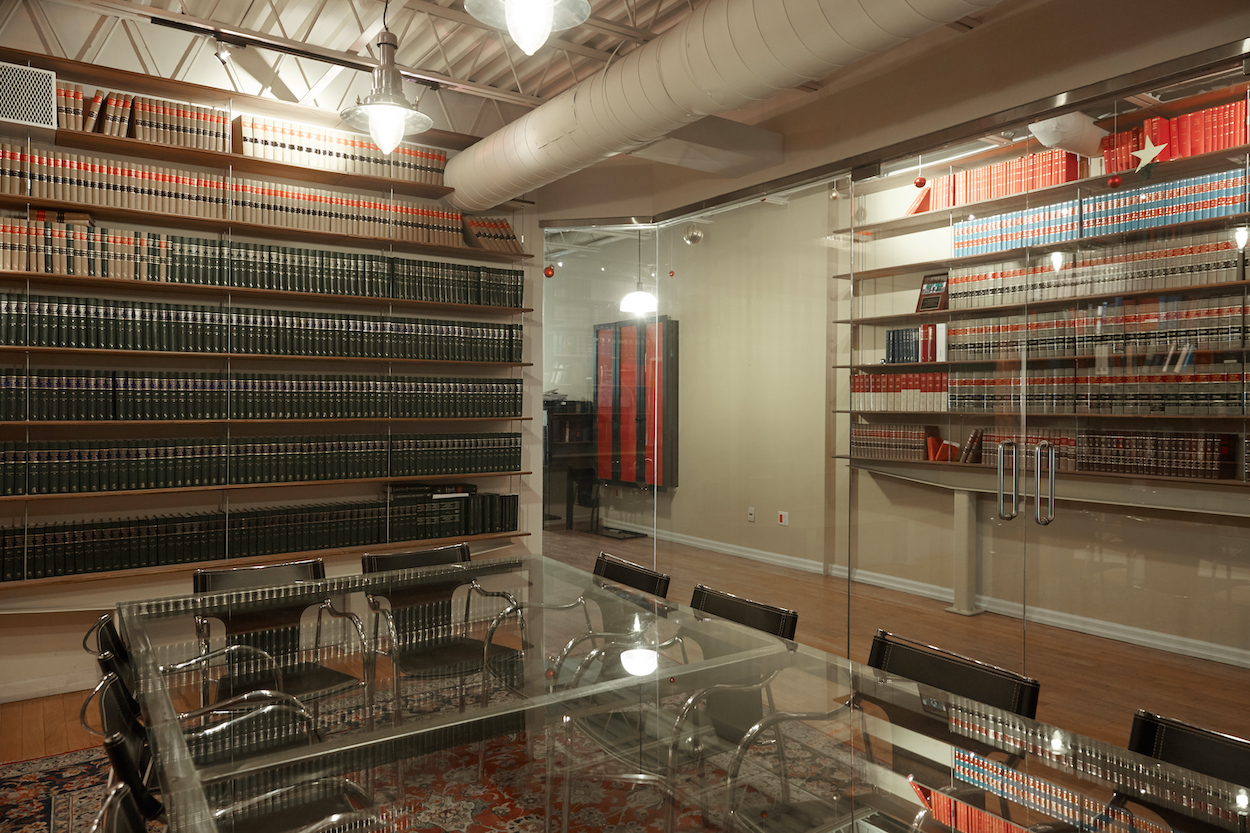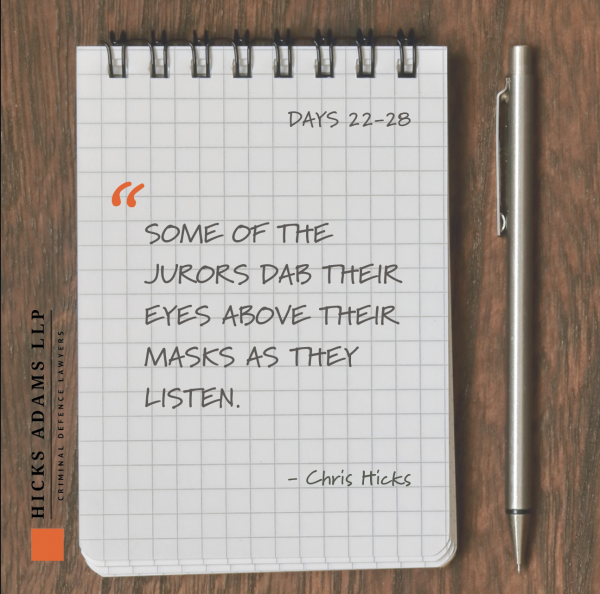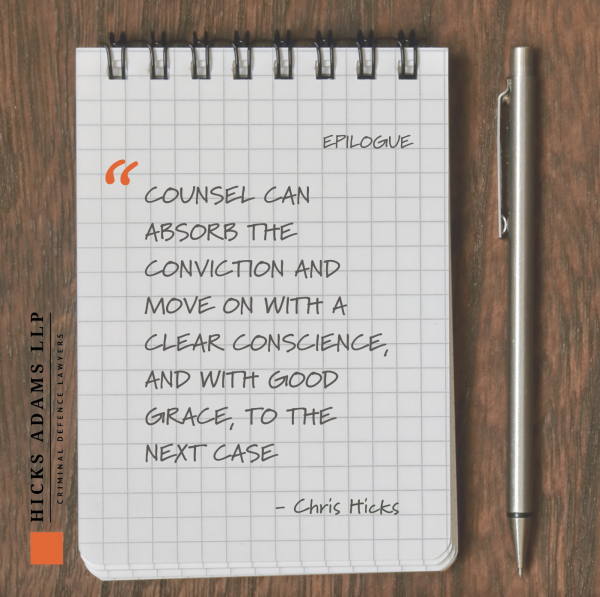Criminal defence lawyer and partner at Hicks Adams LLP Christopher Hicks has written a series of journal entries to take readers behind the scenes of something few people have exposure to: a trial for first-degree murder. In these journals, readers will experience the daily progress of a trial from the defence lawyer’s point of view, with the lawyer’s perspective on everything including witness testimony, judicial rulings and legal strategy.
Making this series especially unique is the fact that this is the first jury trial to go forward in Ontario after the start of the Covid-19 pandemic. With new safety protocols in place, everything is different from the placement of the jury, the lack of observers in the public gallery and even the freedom of movement for the lawyers.
In a nine-part series, Christopher Hicks will take readers through the highly unusual process of running a murder trial during a pandemic, providing rare insights and information as you follow along on the journey from start to finish. See previous installments by clicking on the links below:
Part 1; Part 2; Part 3; Part 4; Part 5; Part 6; Part 7; Part 8
DAYS 22-24
These 2 court days are spent discussing Justice Bird’s jury charge.
Justice Bird reveals a draft charge and then counsel make submissions on suggested changes. Justice Bird retreats from the turmoil and soon republishes an amended draft charge with the changes she has accepted.
I urge the trial judge to give the jury what is referred to as an “O’Connor instruction”. This instruction to the jury says that Robbie McGregor has testified. If the jury decides that they reject his testimony, they cannot use their disbelief of his exculpatory testimony as evidence of guilt, unless there was independent evidence that his testimony had been fabricated. There was no such evidence in this trial. Justice Bird accepts this submission and includes an O’Connor instruction in her charge to the jury.
DAY 25
This is the day for addressing and charging the jury. The fourteen jurors are all present. Not one has been lost to a Covid-19 infection nor any other cause. Later, the court registrar, Bernadette, will pull two juror numbers from a drum and those jurors will withdraw. The remaining 12 will determine the verdict.
Counsel for the defence addresses the jury first. This is because the Criminal Code stipulates that when the defence calls evidence, the defence must address the jury first.
In the many years over which I have addressed juries, I have always stood only a few feet from the front and middle of the jury box, the better to look the jurors in the eye, assess their reaction to my words, and to modulate my delivery.
My address customarily takes about an hour, often less but not more. People just can’t focus and stay with a speaker for any longer than that. For this trial, bowing to Covid-19, I stand at a podium about 3 metres from the nearest juror and about 15 metres from the farthest jurors. The jurors are all masked. I take my mask off to speak. I am surrounded by plexiglass.
The prosecution addresses the jury. Later, the trial judge begins her charge to the jury but there is not enough time in the court day for her to finish.
DAY 26
Justice Bird concludes her charge, and the jury retires to consider their verdict.
In a few hours, the jury requests a map that is an exhibit and asks to re-hear the evidence of one witness. Counsel, the judge and the jury all listen to re-play of the audio-recorded evidence. This is the evidence of a friend of Robbie McGregor who testified at the first trial but passed away before the second trial.
Later in the evening, the jurors are excused for the day; sequestered now because they have begun their deliberations, the jurors are taken to a local hotel for the night.
DAY 27
The jurors continue their deliberations. There are no more questions. Later that evening, the jury returns with a verdict:
Guilty of first-degree murder.
Robbie McGregor accepts the verdict with as much good grace as possible.
DAY 28
The sentence for first-degree murder is definitively set by the Criminal Code:
Life sentence, with parole ineligibility for 25 years.
“Life sentence” means that even once released, the convicted person will be on parole for the rest of their life. “Parole ineligibility for 25 years” means no parole is even possible until 25 years have been served. A life sentence is backdated to the first day the accused was in custody for the murder charge.
For Robbie McGregor, this means he started serving his sentence on July 6, 2011 and has presently served more than nine years of the twenty-five. Robbie McGregor accepts his sentence with resignation.
This sentencing hearing is also structured to receive victim impact statements. The jurors attend for the sentencing although their presence is not necessary. We are all masked as various members of Joanne MacKenzie’s family and friends go to the witness stand and read prepared statements expressing their loss and pain from the death of Joanne MacKenzie.
Some of the jurors dab their eyes above their masks as they listen.
EPILOGUE
The jury’s verdict of guilty of first-degree murder means that Robbie McGregor’s testimony did not raise a reasonable doubt in the jury’s mind.
The fact that Robbie McGregor had testified, I had stressed to the jury, did not mean that the defence had to prove anything. The purpose of his testimony was only to raise a reasonable doubt in their minds about the events of the morning of July 2. The burden of proof was on the prosecution, and never shifted to the defence. The burden of proof is proof beyond a reasonable doubt on the essential elements of the offence charged by the prosecution.
By their verdict, the jurors demonstrated that they did not accept the core of Robbie McGregor’s evidence – that because of what his mother and daughter had said to him, he sincerely and honestly believed that his daughter had been sexually abused and that this belief drove him to contact Joanne MacKenzie that tragic morning.
The prosecution had presented two contrary theories supporting first-degree murder: 1) the murder was planned and deliberate, and the luring of Joanne MacKenzie by a lie involving her daughter was part of that plan; or, 2) this was a constructive first-degree murder, and Joanne had been lured by a lie about her daughter into a state of forcible confinement and was then vulnerable to a lethal attack.
The jurors did not have to be unanimous about the route to a conviction but could take either path as long as they were sure that the prosecution had proved that path beyond a reasonable doubt.
If Robbie McGregor had raised a reasonable doubt in his testimony about the sexual molestation issue, he would have blocked both paths to conviction, and he would have been acquitted of first-degree murder. The jury then would have continued its deliberations to reach a verdict on second-degree murder or manslaughter.
The verdict and sentence on murder in the first degree impacted everyone involved in this trial. This is the most serious charge in the Criminal Code and the most severe penalty that can be imposed on a convicted person, and everyone in the courtroom understood the gravity of the situation.
As counsel for Robbie McGregor, Joanne Griffiths and I felt the impact and understood the gravity as well.
We did, however, have this consolation: We had worked very hard and done everything we could do and said everything we could say, on behalf of our client, and thus we could absorb the conviction and move on with a clear conscience, and with good grace, to the next case.
Christopher Hicks is one of the founding partners of the criminal law firm of Hicks Adams. He has been practicing criminal law for more than two and a half decades, with a special interest, and extensive experience, in jury trials and appeals. In the course of his career, Christopher has been involved in scores of jury trials involving the most serious crimes in the criminal code, has argued appeals of both conviction and sentence in the court of appeal on a regular basis, and has represented clients in the Supreme Court of Canada on more than a half dozen occasions.
To reach Christopher or any of the experienced and dedicated criminal lawyers at Hicks Adams, contact the firm at 416-975-1700 or online to discuss your matter in confidence.




